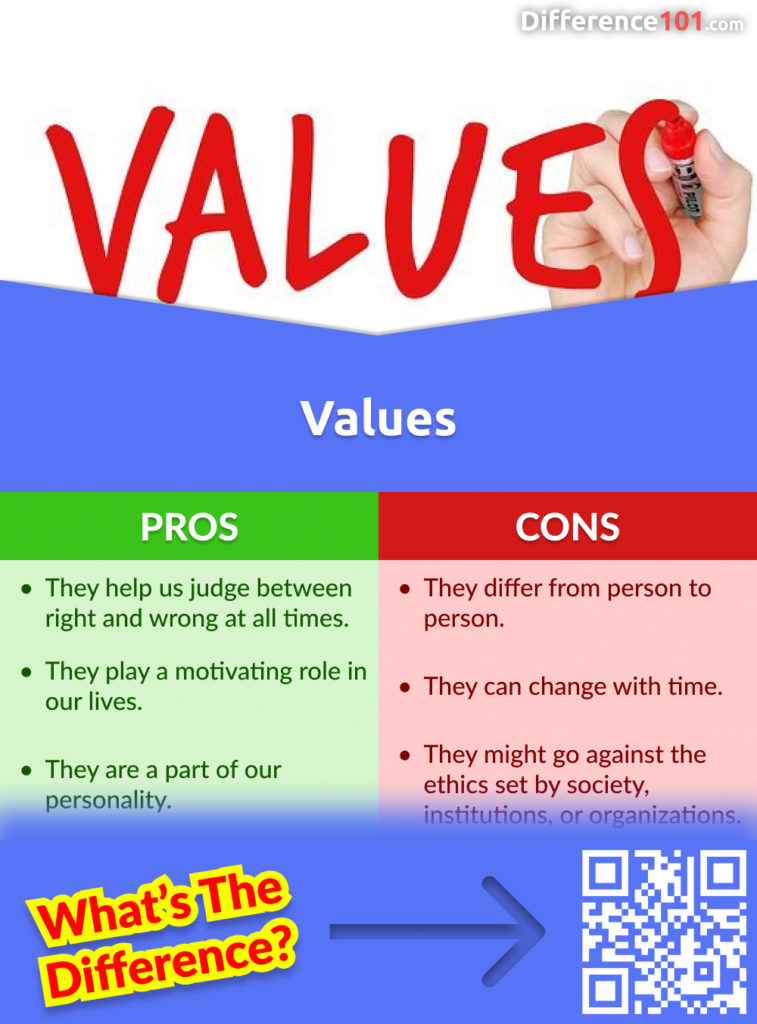Though many people use the words ethics and values interchangeably, they are not the same. The biggest ethics vs values difference lies in the essence of these words. Ethics define what is proper or improper conduct for all of us in a given situation. On the other hand, values are the principles followed by an individual. Where ethics are the same for everyone, values change from person to person.
Let’s take a closer look at values vs. ethics here:
| Meaning | Ethics are guidelines whereas values are principles |
| Consistency | Ethics remain the same for everyone unlike values |
| Impact of time | Ethics does not change with time but values do |
| Limiting or motivating | Ethics are limiting while values are motivating for an individual |
Table of Contents
What are Ethics?

Ethics are the general guidelines that dictate our behavior. They influence society as a whole and tell us what is proper and improper action in a given situation.
What are Values?

Values are the principles that guide an individual’s decisions. They influence a person at an individual level and help him judge between right and wrong.
Ethics vs. Values Pros and Cons
Ethics Pros and Cons

Pros of Ethics
- They help us all make appropriate decisions in different situations.
- They help shape and build our personalities.
- They remain the same for everyone in an organization, society, or institution.
Cons of Ethics
- They are quite limiting since they set limits to our actions.
- They dictate our behavior without knowing our will.
Values Pros and Cons

Pros of Values
- They help us judge between right and wrong at all times.
- They play a motivating role in our lives.
- They are a part of our personality.
Cons of Values
- They differ from person to person.
- They can change with time.
- They might go against the ethics set by society, institutions, or organizations.
Values vs. Ethics Examples
Let us look at some ethics and values examples to further understand the difference between the two:
Examples of Ethics
- Honesty
- Integrity
- Loyalty
- Punctuality
- Compassion
Examples of Values
- Individual perspective
- A person’s judgment ability
- Likes
- Dislikes
- Prejudices
In many cases, ethics and values might overlap. For instance, honesty and punctuality can be an ethic and value at the same time.
Ethics and Values of Social Work
Since social workers help many people facing different circumstances, they might find it challenging to make decisions at times. So the National Association of Social Workers (NASW) has set a Code of Ethics for the social workers that define both the ethics and values of social work. These are:
- Service
- Social Justice
- Dignity and Worth of the Person
- Importance of Human Relationships
- Integrity
- Competence
Bringing out the Similarities between Ethics and Values for Better Understanding
- Both ethics and values shape our personalities.
- They help us make both little and big decisions in our lives.
7 Key Points of Difference Between Ethics and Values
| Basis | Ethics | Values |
|---|---|---|
| Meaning | Ethics are the general guidelines that dictate our behavior. | Values are the principles that guide an individual’s decisions. |
| Consistency | They remain the same for all individuals. | They change from one individual to another. |
| Types | Ethics can be applied, descriptive, normative, and meta-ethics. | Values can be personal, cultural, intrinsic, extrinsic, relative, absolute, philosophic, economic, et al. |
| Impact of time | Ethics does not change with time. | Values might change over time. |
| Influenced by | These are influenced by professions, institutions, and organizations. | These are influenced by culture, religion, family background, and community. |
| Limiting or motivating | They are quite limiting since they set limits to our actions. | They play a motivating role in our lives. |
| Application | These are majorly applied in law, business, and judicial systems. | These are majorly applied in personal, cultural, and economic sectors. |
Comparison Chart

Ethics and Values FAQs
What Is Ethics Philosophy?
Ethics or moral philosophy involves recommending and systematizing different behaviors that are considered either right or wrong.
What Is The Difference Between Ethics And Morals?
There is little difference between ethics and morals. Ethics tells the society as a whole what is proper and improper action in a given situation. Morals reflect the intentions of an individual and impact his behavior in a situation accordingly.
What Are Moral Values?
Moral values are the behavioral standards that are validated by society for being good or bad.
What Are Universal Ethics?
Universal ethics are the standards or practices that can be applied to everyone without any discrimination.
What Core Values Include Ethics?
Ethics are a part of all core values of any person, institution, or organization.
What Are The 3 Types Of Values?
Three types of values are:
- Personal values
- Work values
- Character values
What Is The Similarity Between Values And Ethics?
Both ethics and values help shape our personalities. They impact all the decisions we make in our lives.
Why Are Ethics And Values Important?
Ethics and values tell us how to conduct ourselves in our daily lives. Their importance lies in their guiding abilities that allow people to do the right thing at the right time.
Conclusion
Ethics and values are the defining factors of one’s personality. Though these words are used interchangeably, they bear some differences when we look closely at them. Ethics remain the same for all individuals while values change from one individual to another. Considering ethics vs morals vs values, ethics define proper and improper action in a given situation for everyone while morals and values are behavioral attributes of an individual. So morals are more closely related to values when talking about ethics, values, and morals. Considering the morals vs values difference, it can be observed in their emergence in one’s personality. Generally, morals emerge from the core values of a person. For instance, it is moral not to cheat when a person values honesty. So understanding these little differences will help you know the context in which these words are used.







